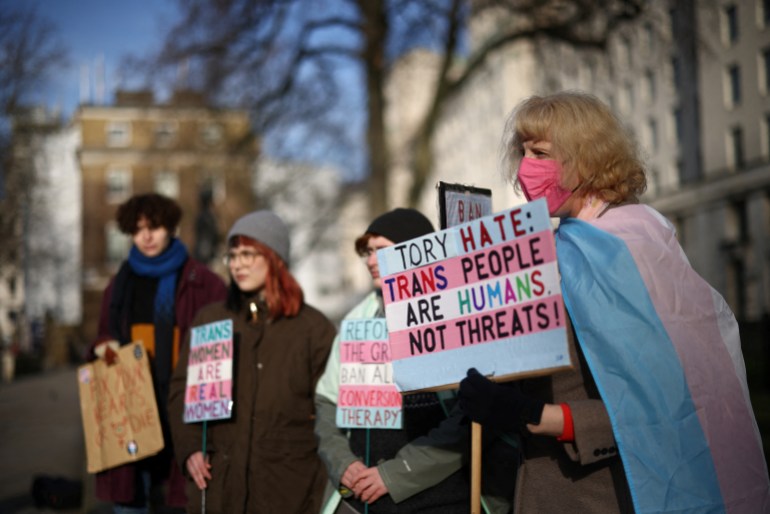The United Kingdom’s Supreme Court has ruled that the terms “woman” and “sex” refer to a “biological woman and biological sex” under UK equality laws, bringing a long-running court battle between feminist groups and the government of Scotland to an end.
Wednesday’s ruling is expected to have far-reaching consequences for policies on whether and how spaces and services reserved for women should be extended to include “trans women” – those born male who have transitioned socially or medically or who identify as women – such as changing rooms, domestic violence shelters and medical services.
Although the case originally began in Scotland, the court’s interpretation of the law will be effective across the UK, including in England and Wales.
Reactions towards the ruling have been mixed: Feminist advocacy groups involved in the legal case have voiced satisfaction, while trans groups and some members of the Scottish government expressed disappointment and fear about future discrimination.
Here’s what we know about the Supreme Court’s ruling and how the case started:
 Marion Calder and Susan Smith from For Women Scotland celebrate outside the Supreme Court to challenge gender recognition laws, in London, UK, Wednesday, April 16, 2025 [Kin Cheung/AP]
Marion Calder and Susan Smith from For Women Scotland celebrate outside the Supreme Court to challenge gender recognition laws, in London, UK, Wednesday, April 16, 2025 [Kin Cheung/AP]What was the case about and how did it start?
The legal dispute began in March 2018 when the Scottish Parliament passed an act stating that 50 percent of non-executive members of the boards of Scottish public bodies must be women.
The act, which is known as Holyrood’s Gender Representation on Public Boards (Scotland) Act 2018, was supposed to ensure better representation for women in public bodies.
A sticking point in the policy, however, was the definition of “woman”. The act itself said that “women” included transgender women who held gender recognition certificates (GRCs) – that is, trans women who have legally transitioned and are certified by the government as having changed their gender.
A feminist group, For Women Scotland (FWS), challenged the new law and launched a petition against it in 2018. The group argued that the Scottish parliament had wrongfully defined “woman” and that the law had failed to use legal definitions as set out in the UK Equality Act of 2010.
That Act prohibits discrimination based on age, disability, gender reassignment, marriage or civil partnership (in cases of employment), pregnancy and maternity, race, religion or belief, sex, and sexual orientation.
However, the UK Equality Act 2010 does allow for separate or single-sex services to be provided when this is reasonably necessary, such as for reasons of privacy, decency or preventing trauma.
A Scottish court dismissed the first case brought by FWS in 2022, concluding that the Scottish legislation did not necessarily redefine “woman” by including transgender women. The judge ruled that women were “not limited to biological or birth sex”.
FWS launched an unsuccessful appeal in 2023. The case was then heard at the Scottish Court of Session several times as the group sought to clarify how to correctly interpret the term “woman” as enshrined in the Equality Act.
In March 2024, the advocacy group, backed by other feminist organisations and lesbian groups, appealed to the Supreme Court. The group was also supported by Harry Potter author and women’s rights campaigner JK Rowling, who reportedly donated 70,000 pounds ($92,000) to a crowdfunding campaign by FWS.
 The rainbow flag, bottom right, a symbol of the lesbian, gay, bisexual, and transgender community, flies alongside the UK, left, and the Scottish flags over the UK government’s Scotland Office building, in central London, Friday, March 28, 2014 [Lefteris Pitarakis/AP]
The rainbow flag, bottom right, a symbol of the lesbian, gay, bisexual, and transgender community, flies alongside the UK, left, and the Scottish flags over the UK government’s Scotland Office building, in central London, Friday, March 28, 2014 [Lefteris Pitarakis/AP]What did the Supreme Court decide, and how does the UK law define ‘woman’?
On Wednesday, five judges ruled unanimously that the term “woman” in the existing UK Equality Act should be interpreted as only people born biologically female, and that trans women, even those with GRCs, should be excluded from that definition.
The ruling further clarified, therefore, that trans women can be excluded from certain single-sex spaces and groups designated for women, such as changing rooms, homeless and domestic violence shelters, swimming areas and medical or counselling services.
“Interpreting ‘sex’ as certificated sex would cut across the definitions of ‘man’ and ‘woman’ … and, thus, the protected characteristic of sex, in an incoherent way,” Justice Patrick Hodge said while summarising the case. “It would create heterogeneous groupings.”
The court added that the ruling was not a “triumph” of one side over the other, and emphasised that transgender people are still protected from discrimination under UK law. However, some protections, the judges clarified, should only apply to biological females and not transgender women.
 Transgender rights supporters protest in favour of Scottish gender reform bill outside Downing Street in London, UK, January 17, 2023 [Henry Nicholls/Reuters]
Transgender rights supporters protest in favour of Scottish gender reform bill outside Downing Street in London, UK, January 17, 2023 [Henry Nicholls/Reuters]What are the broader implications?
Until now, trans women with GRCs could be counted as women for the purpose of all-women shortlists for political parties or to fill quotas for women on boards or within organisations. This will no longer be the case.
In the 20 years since the Gender Recognition Act was passed in the UK, nearly 8,500 GRCs have been issued.
The Gender Recognition Panel received 1,397 applications for GRCs in 2023-2024 – a record number. Of those, 1,088 were granted. This was triple the number of applications in 2020-2021, after which the application fee dropped from 140 to 5 pounds ($180 to $7).
The ruling provides some clarification on an issue that has proved polarising not only in the UK but also in the United States.
Debates have raged in both countries, as well as in other Western nations, on whether certain women’s rights, services or spaces should be extended to trans women. US President Donald Trump is facing legal challenges for signing orders to define sex as only male or female. Trump has also tried to ban transgender people from entering the military and block trans people from participating in sports teams that do not align with their biological sex.
It’s unclear how the ruling could affect sport in the UK, but trans women may now be restricted, if not excluded, from women’s categories. There’s no nationwide rule on how different sport organisations should include transgender people. Presently, the English Football Association allows trans women to compete in the women category if their testosterone levels are below five nanomoles per litre for at least 12 months. Women typically have 2.5 nanomoles per litre. On the other hand, British Cycling bans trans women from women’s competitions altogether.
Rules regarding how domestic violence centres run may also be reassessed. In 2021, RISE, a shelter for women in Brighton, lost 5 million pounds ($6.2m) in local government funding after an assessment found that it did not provide services to trans women. The organisation said it was forced to close its refuge services for women, but was able to continue providing services like therapy.
What are the arguments for and against the inclusion of trans women as women?
Groups like FWS argue that biological sex cannot be changed and that the rights of transgender people should not come at the expense of women. Allowing trans women to be included in the definition of women would reduce protection for people born female, they argue.
Previously, FWS director Triba Budge argued that the Scottish Act at the root of the legal case could be interpreted to mean that public boards could legally consist of “50 percent men and 50 percent men with certificates” – referring to trans women holding GRCs – therefore excluding biological women altogether.
On the other hand, trans rights groups say they require the same protections as women. The ruling on Wednesday excludes transgender people from sex discrimination protections and conflicts with human rights laws, they argue.
The Supreme Court’s decision would also undermine protections for trans people covered in the UK’s 2004 Gender Recognition Act, opponents said. The law allows trans people to obtain a GRC and update the sex recorded on their birth certificate accordingly, but trans groups say that recognition could now be undermined.
Some believe the ruling will lead to more attacks on trans people. Rights and hate monitoring groups note that the average trans person is more likely than others to face discrimination and physical, sexual, or verbal harassment.
Stop Hate UK, which monitors attacks on minority groups in the country, reports that the UK police recorded 2,630 hate crimes against transgender people in 2021. The group said that was a 16 percent increase from the previous year and that it was likely an undercount, as most trans people do not feel safe enough to report attacks.
 Marion Calder, centre, and Susan Smith, left, from For Women Scotland, celebrate outside after the UK Supreme Court ruled that a woman is someone born biologically female, excluding transgender people from the legal definition in a long-running dispute between the feminist group and the Scottish government, in London, UK, Wednesday, April 16, 2025 [Kin Cheung/AP]
Marion Calder, centre, and Susan Smith, left, from For Women Scotland, celebrate outside after the UK Supreme Court ruled that a woman is someone born biologically female, excluding transgender people from the legal definition in a long-running dispute between the feminist group and the Scottish government, in London, UK, Wednesday, April 16, 2025 [Kin Cheung/AP]How have different groups reacted to the Supreme Court ruling?
FWS and other feminist groups that joined the organisation in the final Supreme Court case celebrated outside the court on Wednesday after the ruling was pronounced.
Supporters chanted “Women’s rights are human rights” and popped bottles of wine in celebration.
“Everyone knows what sex is and you can’t change it,” Susan Smith, who co-directs FWS, told The Associated Press news agency. “It’s common sense, basic common sense, and the fact that we have been down a rabbit hole where people have tried to deny science and to deny reality, and hopefully this will now see us back to reality.”
“We are delighted,” Sex Matters, another group involved in the court case, said in a statement on Wednesday. “The court has given us the right answer: The protected characteristic of sex – male and female – refers to reality, not to paperwork,” the statement read.
On the other hand, trans advocacy groups voiced disappointment.
“We are really shocked by today’s Supreme Court decision, which reverses 20 years of understanding on how the law recognises trans men and women with Gender Recognition Certificates,” Scottish Trans said in a statement.
The group also accused the court of hearing only from organisations on one side of the debate, and not from trans people. “We think their judgement reflects the fact that trans people’s voices were missing,” the statement read.
Maggie Chapman, a legislator of Scotland’s Green Party which has been at the forefront of championing trans rights, said the ruling was “deeply concerning” for human rights and “a huge blow to some of the most marginalised people in our society”.
“Trans people have been cynically targeted and demonised by politicians and large parts of the media for far too long. This has contributed to attacks on longstanding rights and attempts to erase their existence altogether,” Chapman added.
Meanwhile, the Scottish government said it would accept the ruling.
The Scottish Government accepts today’s Supreme Court judgement. The ruling gives clarity between two relevant pieces of legislation passed at Westminster. We will now engage on the implications of the ruling. Protecting the rights of all will underpin our actions.
— John Swinney (@JohnSwinney) April 16, 2025
In a statement posted on X, Scotland’s First Minister John Swinney said the law provided clarity and would be followed.
“We will now engage on the implications of the ruling. Protecting the rights of all will underpin our actions,” Swinney said.
The UK government said the law would clarify issues of service provision in hospitals, refuges, and sports clubs, although in what ways exactly is not yet clear.
“Single-sex spaces are protected in law and will always be protected by this government,” a spokesperson said.
What else is likely to change?
It is expected that government institutions across the UK will begin to make changes in line with the ruling.
One example of the ruling’s potential effect is the case of a Scottish health organisation which is being sued by a nurse it suspended over her objection to a trans woman using a female changing room. The organisation, NHS Fife, said it had noted the judgement.
“We will now take time to carefully consider the judgement and its implications,” a spokesperson said.
British Transport Police has already updated a controversial search policy from September 2024 that allowed transgender detainees with a GRC to be searched by officers of their acquired gender. That has now changed, spokesperson Daisy Collingwood told Al Jazeera.
“We have advised our officers that any same-sex searches in custody are to be undertaken in accordance with the biological birth sex of the detainee,” Collingwood said. “We are in the process of reviewing the implications of the ruling and will consider any necessary updates to our policies and practices in line with the law and national guidance.”
Meanwhile, legal experts say the ruling showed equality legislation might need to be urgently updated to ensure trans people are protected.
.png)
 2 days ago
2
2 days ago
2






 English (US) ·
English (US) ·